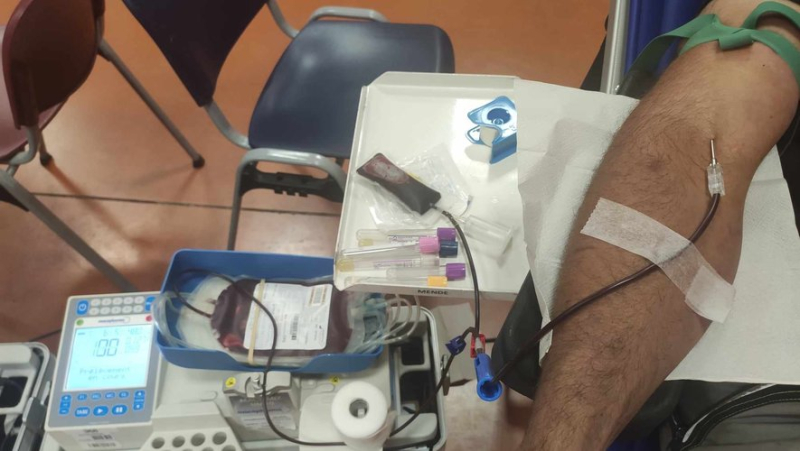A new EFS collection takes place in Mende, it is an opportunity to discover the fascinating journey of blood

Il est possible de donner son sang quatre fois par an pour les femmes et six pour les hommes. MIDI LIBRE – SK
L’Établissement français du sang (EFS) organise une collecte à Mende les 9 et 10 septembre 2024.
In Lozère, between 3% and 4% of the population give blood during the four annual blood drives organized by the French Blood Establishment. How is it processed, checked, redistributed?? From collection to transfusion, Isabelle Paradis, the doctor responsible for blood drives in Lozère and Aveyron, explains everything.
To begin with, what is the function of blood and why is it so important to have reserves??
The role of blood in transfusion is to bring oxygen to the different organs thanks to red blood cells, in order to maintain life. But the blood we collect also contains platelets which, schematically, allow to stop bleeding, and plasma, which is a clotting factor. These three elements can be used in the same patient or separately, which is why it is said that a donation can save three lives.
How are blood bags treated after donation ?
Every evening they are sent to Toulouse on a preparation platform: we will separate our three elements because each has a different duration and storage temperature. The red blood cells are kept for a maximum of 42 days, at 4 °C ; the platelets at 20 °C, for seven days and the plasma is frozen and kept at – 25 °C for a maximum of one year. At the same time, small samples are taken during the donation, sent to Montpellier, to the EFS laboratory which manages the whole of the south of France and which will immediately carry out a biological qualification of the donation (QBD). The bags remain on hold in Toulouse until the results of these analyses are returned.
What are we looking for in these samples ?
Blood grouping, standard blood count and we make sure that there are no antibodies that could be directed against the patient's red blood cells. For example, when a woman is pregnant, the baby carries half of the father's genetic heritage and therefore has antigens unknown to the mother. There is then the risk of antibodies developing that make any transfusion impossible.
We also look for syphilis, HIV, hepatitis B, C and E; seasonal arbovirosis depending on the diseases brought to the collection period by mosquitoes and finally we look for malaria and Chagas disease, depending on the country where the donor has traveled in recent years. This last search is triggered when a trip has been declared on the pre-donation questionnaire.
How is this questionnaire useful when the blood is systematically analyzed. We think for example of the number of sexual partners in the last four months…
Because there is what is called a serological window: you can have had a positive contact with a virus, without the body's immune response being detectable yet. If you have multiple partners, you increase the risk of non-detection. The duration of this window varies: it takes X days for HIV to be detectable; another X days for syphilis… In four months we are certain to cover all the targeted viruses.
What happens next when the results are sent to Toulouse ?
When something goes wrong with the samples, for example when HIV is detected, the donation is destroyed, incinerated, in the same way as contaminated waste in hospitals. It is not the EFS but a specialized structure that takes care of this. When, on the contrary, the sample is validated, the bags are labeled and then sent to the various distribution centers in the region. Generally speaking, a donation made in Mende will therefore go preferentially to a sick person in the region, except in cases of exceptional needs and periods of tension.
Collection at Antirouille on September 9 and 10, 2024, from 1 p.m. to 6:30 p.m. I subscribe to read the rest




